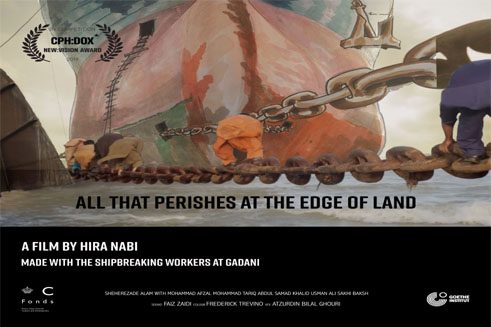Azmaish: A Journey Through the Subcontinent (2017) by Sabiha Sumar
Two courageous women, Pakistani Director Sabiha Sumar and French-Indian actress Kalki Koechlin set off on an extraordinary journey through India and Pakistan.
Pakistan and India were born in 1947 and forged in a cauldron of empire, ideology, and imagined communities. It's no wonder they've become only more complex.
Filmmaker Sabiha Sumar is one of Pakistan's most prominent observers. Her documentary Dinner with the President asked hard questions of a wide range of her fellow Pakistanis, including its leader. Now, Sumar turns to the intractable bond and irresolvable tension that defines Pakistan — its relationship with India. But this is not a film about diplomatic strife. Returning to her quiet, insistent method, Sumar travels the two countries asking questions that roll up into one monumental concern: how did growing fundamentalism bring Pakistan and India to the same dangerous threshold?
Azmaish is above all a personal film. Sumar and Koechlin travel and speak as close friends, thoughtful about the currents of history, economics, and culture that inform the present moment in Pakistan and India, but well aware that they're unlikely to land on easy answers. Koechlin quotes the truism about her country: "Whatever is true in India, the opposite is also true." The same holds across the border.
We will also screen All That Perishes at the Edge of Land (2019) by Hira Nabi which was produced as part of our project Film Talents – Voices from Pakistan & Afghanistan.
All That Perishes at the Edge of Land (2019) by Hira Nabi
 Foto: Hira
Foto: Hira
The film had its world premiere last month at CPH:DOX.
blurb from CPH:DOX:
"Old cargo ships sail to the Gadani beach in Pakistan to die. Here, they are chopped up and welded to pieces by casual labourers, who risk their lives and have often left their families to earn a miserable salary. The container ship Ocean Master arrives to meet its fate and begins a stoic monologue: 'There are no conclusions, there is only progress.' The local workers disagree. Their conditions are miserable, their government is corrupt, the future is hopeless and capitalism is the root of all evil. Hira Nabi's fable is an imaginative but all the more scathing critique of it all. Like a blind spot in any conversation about the 'post-industrialized world', the spectacular but ultimately terrifying sight of western maritime fossils on the beach can not be ignored. By bringing the ships to life, and by actually listening to the otherwise invisible people who work on dismantling them, Nabi creates a space between the real and the possible, where something new can grow."
Here is a synopsis for the film:
In this docu-fictional work, ‘Ocean Master’ a container vessel is anthropomorphized, and enters into a dialogue with several workers at the Gadani yards. The conversation moves between dreams and desire, places that can be called home, and the structural violence embedded in the act of dismembering a ship at Gadani. As the workers recall the homes and families they left behind, the long work days mesh indistinguishably into one another, and the desperation that they carry with them like shackles, they are forced to confront the realities of their work in which they are faced with death every day, and how they may survive and look towards the future.
Entry to this event is free and no prior registration is required.
Back